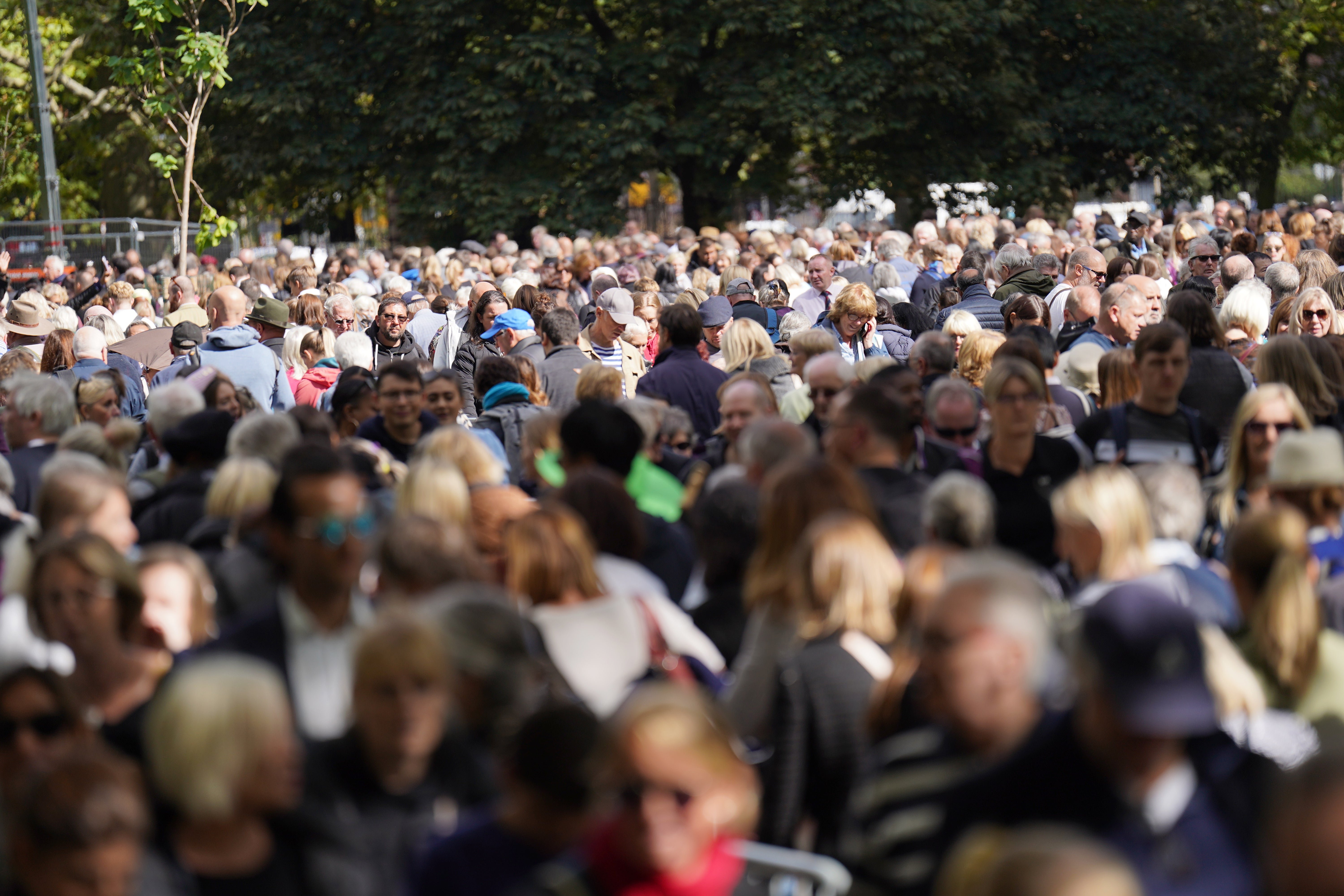Lying in state queue 24 hours long as overnight temperatures look set to fall
The queue to see the Queen lying in state is now expected to take more than 24 hours and the Government has warned it will be cold overnight.

Your support helps us to tell the story
From reproductive rights to climate change to Big Tech, The Independent is on the ground when the story is developing. Whether it's investigating the financials of Elon Musk's pro-Trump PAC or producing our latest documentary, 'The A Word', which shines a light on the American women fighting for reproductive rights, we know how important it is to parse out the facts from the messaging.
At such a critical moment in US history, we need reporters on the ground. Your donation allows us to keep sending journalists to speak to both sides of the story.
The Independent is trusted by Americans across the entire political spectrum. And unlike many other quality news outlets, we choose not to lock Americans out of our reporting and analysis with paywalls. We believe quality journalism should be available to everyone, paid for by those who can afford it.
Your support makes all the difference.People are expected to queue for 24 hours from Friday evening to see the Queen lying in state, and the Government has warned “overnight temperatures will be cold”.
The Department for Digital, Culture, Media and Sport’s (DCMS) online tracker says the expected wait time is more than 24 hours, warning of chilly temperatures as people queue from Southwark Park in south-east London to pay their respects to the Queen’s coffin in Westminster Hall, about five miles away.
Undeterred, a steady stream of people joined the queue on Friday evening, many wearing coats and jumpers.
Tatie Kirst, 38, of Canada Water in south-east London, a project manager who had just joined the queue in Southwark Park, said: “Well, it’s a journey right?
“I think I’m prepared, I brought my good coat, I have a stool if I need to sit, I’m getting food and water, and we’re going to walk the way.
“I think there is always a question, Is it worth it? Can I make it? And hopefully, yes.
“I wanted to be part of this, pay my respect to the Queen.”
The queue was earlier paused for 40 minutes when it reached capacity, and when it reopened mourners were urged by the DCMS not to join the line until at least 4pm.
Officials stopped people joining the queue entirely at around 11.35am at the entrance to Southwark Park due to overwhelming demand.
Downing Street said the queue system was going to plan.
James Birchall, 33, a trainee physiotherapist who travelled from Liverpool to pay his respects, was also queuing.
He said: “Now I just feel normal and unemotional but as I get closer and closer (to the Queen’s coffin) I think I’ll start to become more emotional and maybe five minutes before I go in I’ll probably, even though I don’t look like the type of person, I’ll probably start crying.
“I absolutely loved the Queen, she was great, she had been there all my life, I have always had respect for her. She was great for our country, always did her duty right until she died.
“When she died I was overcome with emotion and I thought, I have got to come to London to see it.”
On the thousands of people queuing, he added: “I’m absolutely amazed because there is so many people, young and old — I did not think young people would come, necessarily, because they are not really in tune with monarchy, but there’s so many young people here to pay their respects which I think is awesome.”
Also queuing was Vlasta Picker, 73, of Bedford, who said: “I came here in 1977 on the Silver Jubilee.
“Growing up in central Europe, monarchy was a thing of the past, history.
“I was really quite mesmerised, it was massive in 1977 and I have admired her ever since because she was a wonderful person, unique.
“To serve all her life until the end, it’s something, isn’t it? Unprecedented. And that’s why I want to be here.”
Figures from the London Ambulance Service (LAS) show that 435 members of the public were treated along the route of the queue to see the Queen lying in state and surrounding areas over the past two days.
Some 291 people along the route of the queue and nearby in London were given medical assistance on Wednesday, with 17 needing hospital treatment, the LAS said.
A further 144 people were treated on Thursday, with 25 people being taken to hospital.
The LAS said the majority of incidents attended were faints and collapses, resulting in head injuries.